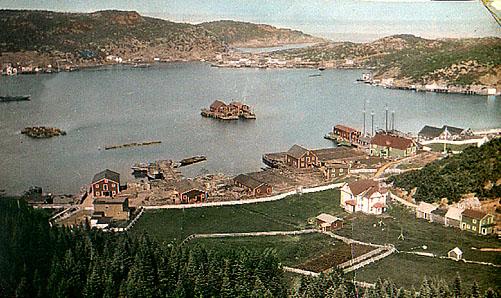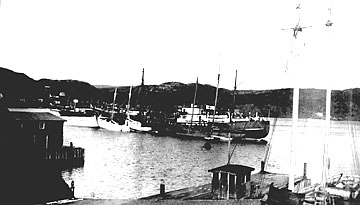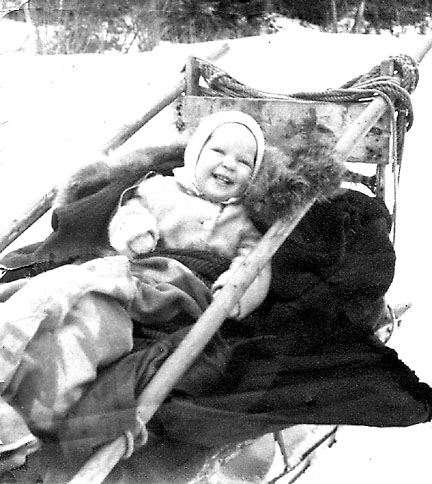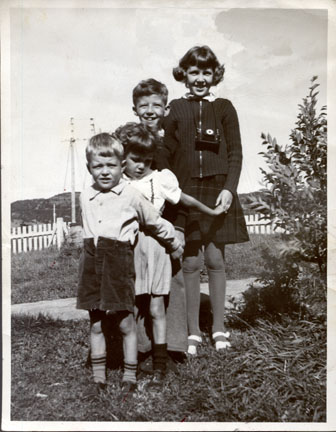
|
| Marilyn Verge | Rafael Solís |
|
My Life in Newfoundland
A brand new passenger boat was engaged to bring my parents and their brand new baby, me, back home to Little Bay Islands from the hospital in Twillingate. The captain and his wife proudly gave their brand new boat the name of their brand new passenger, This was the first of about three passenger boats called after me, and later on, one schooner. Maybe this is partly why I feel so connected to the sea. I was "marked."
We were surrounded by sea and of course our mode of travel was mainly by boat and dog-team. We were two hours by boat to the mainland of Newfoundland, and eight hours to the nearest hospital. At the age of two-and-a-half months I made my first big "sea voyage" on the S.S. Northern Ranger; I was taken to St. John's to meet my maternal grandparents. This trip took about a week. The following winter, at the age of nine months, going into St. John's was more of an adventure – by passenger boat part-way, then a two-day trip by dog-team to connect with the train in Badger. Two days later we arrived in St. John's. I remember another train trip when I was three, and also at that age I travelled by schooner with my family to St. Anthony, in the north. At six I became a stowaway. I remember this well, as it was I, of course, who planned it. I sneaked aboard the passenger boat which was taking my Dad and younger brother to hospital, when I wasn't allowed to go with them. I hid under the blankets on a bunk where the captain and his wife slept, while my Dad and brother were settling into their "quarters" in the stern. I was discovered by the captains wife just as the boat was pulling away from the wharf, and I was off to Twillingate. We were isolated, although I didn't know it at the time. Our mail and supplies arrived by coastal boat in the summer, and by dog team in winter. That island was all we knew, as children; our lives were complete. As Wayne Johnston wrote in "Baltimore's Mansion," An island, until you leave it, is the world. We knew that some people lived on islands and others in cities. Some even lived in lighthouses. The Bobbsey Twins, characters in my favourite books, lived on a houseboat one summer. When I grew up, I was going to live in one, too. We felt truly blessed to be growing up on an island where we had lots of family and where you called your friends' parents aunt and uncle. Our summer playgrounds were wharves and boats; in the winter we perfected our skills on copy-pans (ice pans).We felt sorry for children in larger towns where, we heard, there were big streets and dangerous cars. On our shores, under our wharves, even under the swings in our yard, we played on sand from Egypt, Spain, Portugal, Italy, and the Caribbean. This sand was brought over as ballast by large steamships at the turn of the century. At other times, these ships brought salt, stored in a large shed in the centre of the harbour, then was used for the curing of our fish. These ships returned to their countries across the sea, with their holds filled with fish salted by the families of our little island, and dried by the sun we shared with the rest of the world.
I loved the sea, and still do. I like to feel the salt spray on my face. As a child, I dangled my arm over the side of the boat, dragging my hand in the water, and as I got older I straddled the bow, scraping my toes in the foam. At night while rowing across the harbour, we saw sparks falling from our paddles and lighting our wake. Later we learned this was phosphorescence. Even now, when I visit the ocean, any ocean, and no matter what the season or temperature of the water, I have to remove my shoes and socks and wade in. I have to feel it and get wet. Often, all over, and get soaked to my bones.
I was given my first camera at the age of seven, one I saw in Montgomery Ward's catalogue from Boston. Santa brought it. My first published photograph was one of the ice floes off Little Bay Islands: I submitted it to a Sunday School paper in Toronto, in 1952. It was just three years after Confederation, and Toronto seemed so much further away than England, which was just across the sea. Although I've had a series of cameras over the years, I have fond memories of looking through the lens of that first little camera, and the joy, wonder, and magic of it all. That same joy, wonder and magic is still there.
|
| Marilyn Verge | Rafael Solís |



